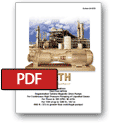Magnetic Drive Chemical Pump
Roth offers sealless magnetically driven pumps, which require an NPSHr of only 1 ft (0.30m) FULL CURVE. These pumps can produce any level of differential pressure to 1500 ft (457m) (this pressure is 900 ft (274m) greater than centrifugal pumps and capacities from 4 to 180 GPM (0.91 to 40m3/hr).
Construction includes non-magnetic stainless steel parts for improved corrosion resistance and improved performance by reducing eddy currents. All bearing surfaces are provided with grooves to provide constant lubrication. High discharge pressure provides sufficient margin above vapor pressure to insure the fluid being pumped stays in its liquid phase as it passes through the magnetic drive. If you have environmental concerns, consider this pump.
Continuous pumping of liquids with the following characteristics is now possible with ZERO leakage of:
- Liquefied gases
- Hazardous liquids
- Toxic liquids
- Caustic liquids
- Liquids that react when released to the atmosphere
Features – Primary liquid containment with secondary control to stop “errant emissions” by use of:
- Hermetic seal between magnetic coupling and liquid end.
- Static O-ring or gasket seal between containment shell and pump casing, no external dynamic shaft seal required.
- Non-magnetic stainless steel containment shell
Non-Magnetic containment reduces “eddy current” losses, generates less heat, lowers power consumption and has higher torque capability than standard mechanical seals.
High pressure process liquid from the regenerative turbine stage assures liquid phase flush flow through the hydrodynamic bearings. This liquid phase flush flow provides cooling and lubrication for the (alpha grade silicon carbide) hydrodynamic bearings in the drive. Primary containment shell is self venting back to the supply vessel.
What is a magnetic drive pump?
Magnetic drive pumps, also known as mag drive pumps, are a type of pump used in industries where the handling of hazardous or corrosive fluids is required. These pumps have a unique design that eliminates the need for mechanical seals, which are prone to wear and tear and can lead to fluid leaks. Instead, mag drive pumps use a magnetic coupling to transfer power from the motor to the impeller, allowing the fluid to be transferred without any physical contact between the motor and the fluid.
The magnetic coupling consists of two sets of magnets, one set attached to the motor shaft and the other to the impeller. When the motor rotates, the magnetic field causes the impeller to rotate, thereby transferring the fluid through the pump. This design eliminates the need for a mechanical seal, making the pump leak-free and suitable for handling hazardous and corrosive fluids.
Mag drive pumps are ideal for handling fluids that are sensitive to contamination, as they prevent any external material from entering the fluid. They are also suitable for handling fluids at high temperatures and pressures, making them a popular choice in chemical and pharmaceutical industries. Additionally, mag drive pumps require less maintenance than traditional pumps with mechanical seals, making them more cost-effective in the long run.
When selecting a mag drive pump, it is essential to consider factors such as the type of fluid being transferred, the flow rate, and the required pressure. It is also crucial to ensure that the pump is made of the right materials to handle the specific fluid being transferred.
Mag drive pumps are a reliable and cost-effective option for handling hazardous and corrosive fluids. Their unique design eliminates the need for mechanical seals, making them leak-free and ideal for applications where contamination needs to be avoided. When selecting a mag drive pump, it is essential to consider factors such as the type of fluid being transferred and the required flow rate and pressure. With proper selection and maintenance, mag drive pumps can provide years of trouble-free operation.
Overall, magnetic drive pumps offer numerous advantages over traditional pumps, such as improved safety, reduced maintenance, and increased reliability, making them an excellent choice for handling hazardous and corrosive fluids in various industrial applications.






